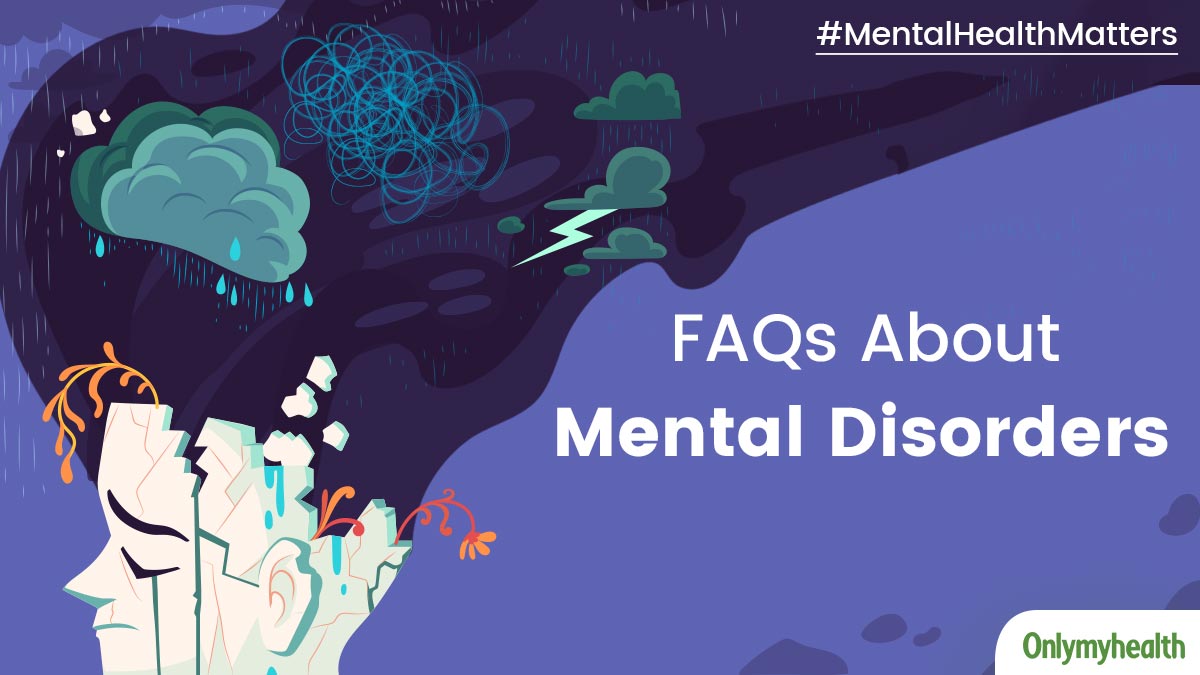
Mental health disorders are prevalent and impactful conditions that affect millions of individuals worldwide. These conditions can significantly impair an individual's daily functioning, relationships, and overall well-being. This week, as part of our 'Mental Health Matters' campaign, we provide insights into mental health disorders and address frequently asked questions related to them.
Table of Content:-
We spoke to Archana Singhal, Counsellor and Family Therapist, Founder, Mindwell Counsel, and Member of the Counsellors Council of India and WICCI NPWC, who shared information on the same.
What Is A Mental Disorder?

According to the World Health Organization (WHO), a mental disorder is defined by clinically significant impairments in an individual's cognition, emotional control, or behaviour. WHO data reveals that one in every eight people globally lives with a mental disorder. These disorders can be intermittent or persistent (chronic) and can have a significant impact on an individual's capacity to interact with others and function daily.
What Are The 7 Mental Health Disorders
Anxiety Disorders
Unlike temporary anxiety, these disorders cause persistent and chronic anxiety. Generalised anxiety disorder, panic disorder, Obsessive-Compulsive Disorder (OCD), Post-Traumatic Stress Disorder (PTSD), and Social Anxiety Disorder (SAD) are all common kinds.

Mood Disorders
Mood disorders are mental illnesses characterised by strong emotional problems. Common types include depression, bipolar disorder, and dysthymic disorder.
Also Read: #MentalHealthMatters: What Is Depression? Explained
Psychotic Disorders
Psychotic disorders are severe mental illnesses that cause distorted thinking, hallucinations, and delusions. Common types include schizophrenia, schizoaffective disorder, delusional disorder, and brief psychotic disorder. Treatment involves medication and therapy.
Eating Disorders
Eating disorders are serious mental illnesses characterised by a distorted relationship with food, often stemming from underlying issues. Common types include anorexia nervosa, bulimia nervosa, binge eating disorder, pica eating disorder, and rumination disorder.

Personality Disorders
Personality disorders are mental disorders characterised by unhealthy thinking and behaviour patterns. They require psychotherapy for treatment. Common types include borderline personality disorder, narcissistic personality disorder, antisocial personality disorder, and dissociative identity disorder.
Also Read: Mental Health Matters: What Is Personality Disorder, Explained
Dementia
Dementia refers to a group of mental health illnesses that result in significant memory loss, often impairing a person's ability to care for themselves. Common types of dementia include Alzheimer's disease, Parkinson's disease, Huntington's disease, and Wernicke-Korsakoff syndrome. These illnesses cause progressive cognitive decline and require specialised care and support.
Autism
Autism, or Autism Spectrum Disorder (ASD), is a developmental condition with varied symptoms related to communication and social interactions. Psychotherapy can help manage these symptoms.
What qualifies as a mental health disorder?
Singhal said that major mental health disorders include diagnosable mental behavioural or emotional disorders. This causes major functional impairment and seriously affects and limits major life activities.
Who is at risk?

A complex collection of individual, family, community, and structural factors may combine to safeguard or impair mental health at any one time. As per WHO, those exposed to adversity, such as poverty, violence, handicap, or inequity, are at a higher risk. Individual psychological and biological qualities, such as emotional skills, as well as heredity, function as both risk and protective factors. Changes in brain structure and/or function influence many of the risk and protective factors.
Can these disorders be cured or are they lifestyle disorders?
Singhal emphasised that all disorders can be controlled with proper treatment. However, there is no one-size-fits-all approach. Treatments are adjusted and suggested according to the individual's specific requirements and needs.

How do families cope with living with someone with a mental disorder?
Singhal said, “Families of people living with serious mental health disorders get affected a lot. It's normal to feel ashamed and hurt by a family member whose behaviour can be difficult to understand and deal with.”
One of the most important things family members must do is to educate themselves about the disorder and be supportive towards the person.
She further said that psychoeducation is very helpful for family members to get aware of what could be expected from the person going through a disorder and how to cope with them. Family members need to adjust their expectations of that person and have to reserve their relationship with others/ their spouse.
How to take care of someone with a mental health disorder?

Singhal said that you need to extend unconditional support and let them share as much as they want to with you, no matter how little it is. Be aware of the triggers that may worsen their symptoms. It could be specific situations, people, or environmental factors.
Taking care of someone with a mental health disorder can be challenging and demanding. Ensure you prioritise your self-care to avoid burnout. Seek support from friends, family, or therapists, and set boundaries to maintain your well-being.
Bottomline
Mental health disorders are medical conditions, not personal weaknesses or character flaws. Avoid making judgmental or dismissive comments. Educate yourself and others to reduce the stigma associated with mental health.
Disclaimer
The information in this article is provided by an expert, however, we recommend you consult with your mental health expert for a treatment catered to your requirements.
Also watch this video
How we keep this article up to date:
We work with experts and keep a close eye on the latest in health and wellness. Whenever there is a new research or helpful information, we update our articles with accurate and useful advice.
Current Version
Jun 20, 2023 02:30 IST
Published By : Sushmita Sharma